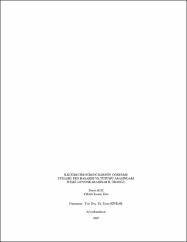İlköğretim Öğrencilerinin Öğrenme Stilleri: Fen Başarısı ve Tutumu Arasındaki İlişki
Abstract
Bu araştırmada, ilköğretim öğrencilerinin öğrenme stilleri ile fene yönelik tutum ve başarıları arasındaki ilişki incelenmiştir. Araştırma Afyonkarahisar ili merkez ilçesinde öğrenim gören ilköğretim öğrencileri ile yapılmıştır. Araştırmada tarama modeli kullanılmıştır. 468 ilköğretim öğrencisine Kolb Öğrenme Stili Envanteri (ÖSE) uygulanarak öğrencilerin öğrenme stilleri belirlenmiştir. Fen tutumunu belirlemek için Fene Yönelik Tutum Ölçeği kullanılmıştır. Verilerin çözümlenmesinde varyans analizi (one way ANOVA), t testi, yüzde ve frekans dağılımı istatistik teknikleri kullanılmıştır.
Araştırmada elde edilen bulgulara göre öğrencilerin en çok özümseyen öğrenme stilini tercih ettiği ortaya çıkmıştır. Değiştiren-özümseyen ve değiştiren-ayrıştıran, öğrenme stilindeki öğrencilerin fen tutumları arasında anlamlı farklılaşma olduğu bulunmuştur. Her bir öğrenme stilindeki öğrencilerin tutumları ile cinsiyet arasında anlamlı bir ilişki olmadığı sonucuna ulaşılmıştır. Değiştiren-özümseyen ve değiştiren- ayrıştıran öğrenme stilindeki öğrencilerin fen başarıları arasında da anlamlı farklılaşma olduğu bulunmuştur. Her bir öğrenme stilindeki öğrencilerin başarıları ile cinsiyet arasındaki ilişki incelenmiş; değiştiren ve yerleştiren öğrenme stilindeki kız öğrencilerin başarılarının yüksek olduğu tespit edilmiştir. The purpose of this study was to investigate the relationship between students’ learning styles and science achievement, and students’ attitudes towards science. There were a total of 468 7th and 8th graders involved in this study that took place in Afyonkarahisar. The researcher used the Kolb’s Learning Style Inventory (LSI) to determine the participants’ learning styles and the Scale of Attitudes Towards Science to find out the attitudes of the participants for science. The independent-samples t-test, descriptive statistics and one way ANOVA with a = 0.05 were employed in the analysis of the data.
The study showed that students preferred the most assimilating learning styles. There was a statistically significant difference found among the achievements of converging-assimilating and converging-diverging learners. Likewise, the study also documented that there was a statistically significant difference detected among the attitudes of converging-assimilating and converging-diverging learners. Furthermore, gender was not a factor on students’ science attitudes. However, gender was an important factor on students’ science achievement.
Collections
- Yüksek Lisans Tezleri [1638]



















